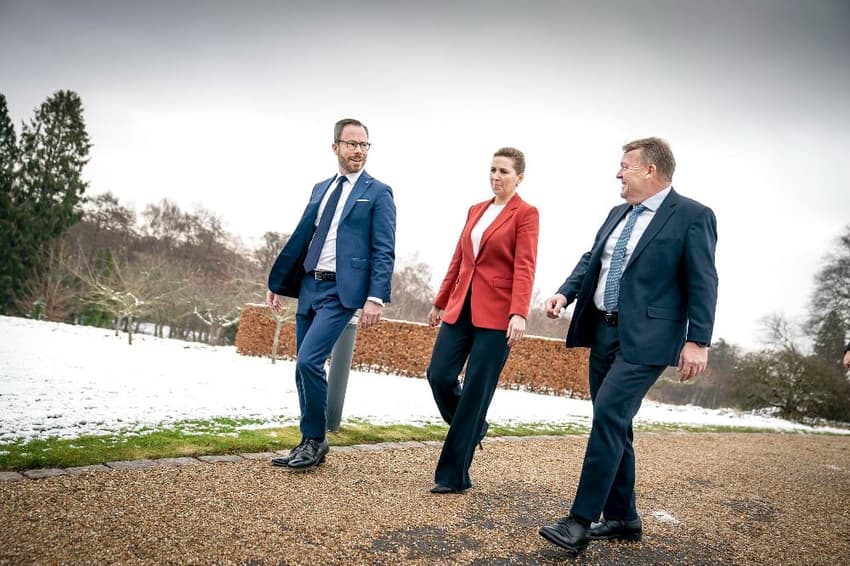Denmark's new government defends rare left-right alliance

Denmark's Social Democratic prime minister and the leader of the main right-wing party on Wednesday defended their new left-right coalition government, a rare alliance last seen 45 years ago.
Prime Minister Mette Frederiksen and her allies on the left won a majority in a November 1st general election, but she chose instead to form a government with a small new centrist party and her traditional rival on the right, the Liberals.
"We are joining forces not because we couldn't do otherwise, because we could have done something else", Frederiksen told reporters at a press conference with the other two party leaders.
READ ALSO: KEY POINTS: What are the main policies of the new Danish government?
"But together we have made the decision to join forces. We choose each other at this point in our history," she added.
Frederiksen is expected to present her cabinet on Thursday.
Danish media have described the coalition, which includes the centrist Moderates party recently founded by former prime minister Lars Løkke Rasmussen, as historic.
The Social Democrats and Liberals have only governed together once before, for just over a year in 1978-1979.
The head of the Liberals, Jakob Ellemann-Jensen, faced the toughest questioning at the press conference, after campaigning during the election to head a right-wing government and rejecting any notion of an alliance with Frederiksen.
"Should I let my pride get in the way... of doing what is right for Denmark?" he replied.
Frederiksen presented the new government's priorities, which included an acceleration of Denmark's defence investments after the invasion of Ukraine, and a faster reduction of CO2 emissions. The country now aims to be carbon neutral by 2045 instead of 2050.
The country of 5.9 million now also expects to reach NATO's budget goal of 2 percent of GDP in 2030 three years earlier than planned.
The country will abolish a public holiday in order to finance the measure.
The new government also announced a tax reform, raising income taxes for the middle class, cutting taxes for high-earners, and introducing a new tax for very high earners.
In a country that has had strict curbs on immigration for the past 25 years, the government also said it would go ahead with previously announced plans to open asylum reception centres outside Europe, possibly in Rwanda, but said it prioritises working with the EU or other European countries on the plan.
Comments
See Also
Prime Minister Mette Frederiksen and her allies on the left won a majority in a November 1st general election, but she chose instead to form a government with a small new centrist party and her traditional rival on the right, the Liberals.
"We are joining forces not because we couldn't do otherwise, because we could have done something else", Frederiksen told reporters at a press conference with the other two party leaders.
READ ALSO: KEY POINTS: What are the main policies of the new Danish government?
"But together we have made the decision to join forces. We choose each other at this point in our history," she added.
Frederiksen is expected to present her cabinet on Thursday.
Danish media have described the coalition, which includes the centrist Moderates party recently founded by former prime minister Lars Løkke Rasmussen, as historic.
The Social Democrats and Liberals have only governed together once before, for just over a year in 1978-1979.
The head of the Liberals, Jakob Ellemann-Jensen, faced the toughest questioning at the press conference, after campaigning during the election to head a right-wing government and rejecting any notion of an alliance with Frederiksen.
"Should I let my pride get in the way... of doing what is right for Denmark?" he replied.
Frederiksen presented the new government's priorities, which included an acceleration of Denmark's defence investments after the invasion of Ukraine, and a faster reduction of CO2 emissions. The country now aims to be carbon neutral by 2045 instead of 2050.
The country of 5.9 million now also expects to reach NATO's budget goal of 2 percent of GDP in 2030 three years earlier than planned.
The country will abolish a public holiday in order to finance the measure.
The new government also announced a tax reform, raising income taxes for the middle class, cutting taxes for high-earners, and introducing a new tax for very high earners.
In a country that has had strict curbs on immigration for the past 25 years, the government also said it would go ahead with previously announced plans to open asylum reception centres outside Europe, possibly in Rwanda, but said it prioritises working with the EU or other European countries on the plan.
Join the conversation in our comments section below. Share your own views and experience and if you have a question or suggestion for our journalists then email us at [email protected].
Please keep comments civil, constructive and on topic – and make sure to read our terms of use before getting involved.
Please log in here to leave a comment.